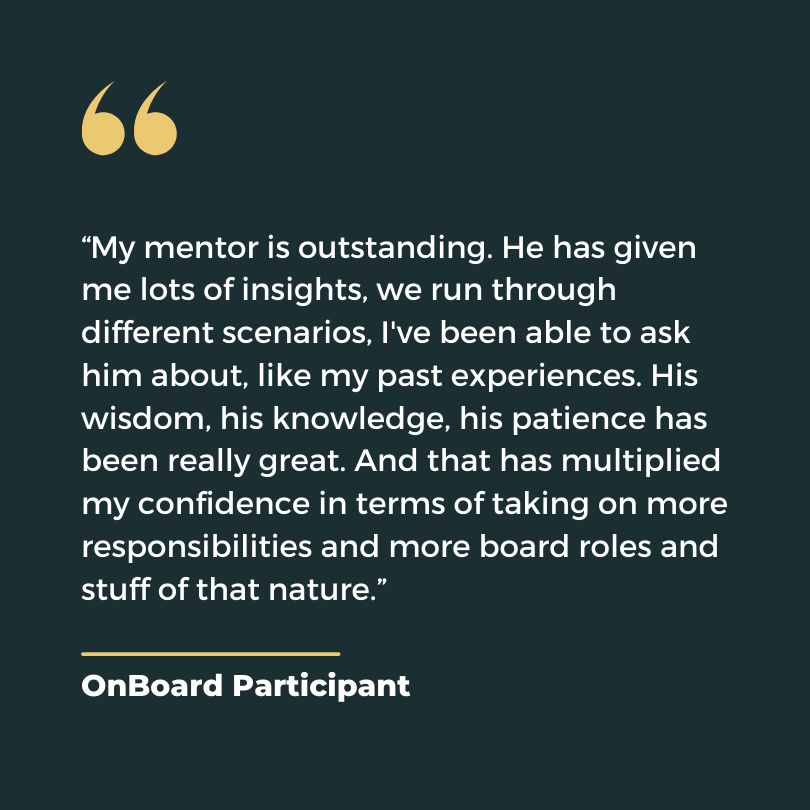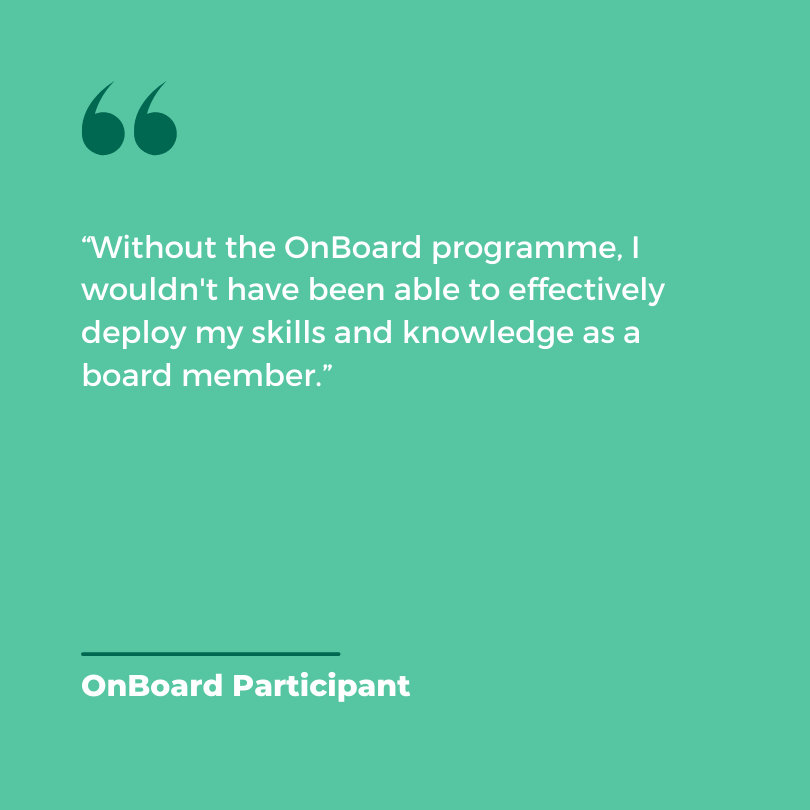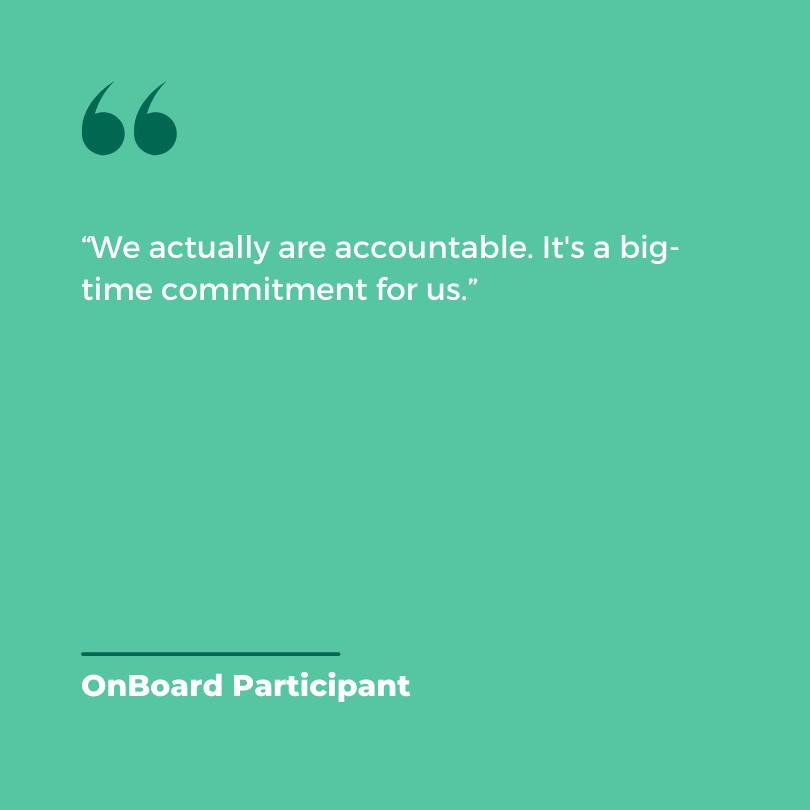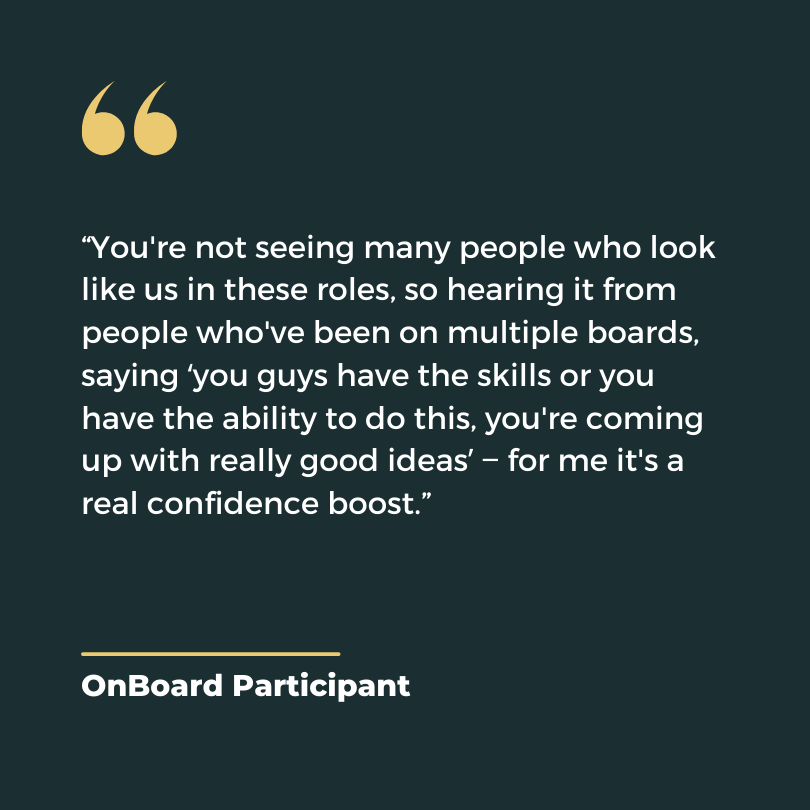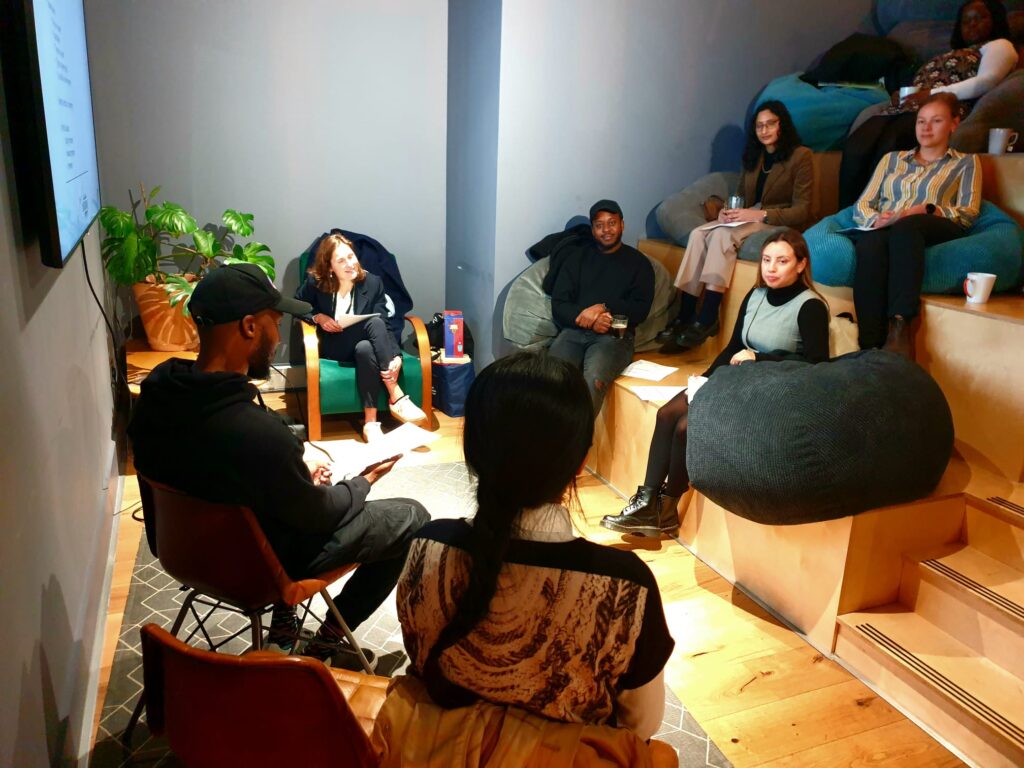
The work that OnBoard Programme Founders, Kenny Imafidon and Liz Mohr, do is essential in ensuring that the diversity of boards is broadened and that they are reflective of the organisations they guide. OnBoard has helped Saxton Bampfylde to encourage boards to consider applications from individuals with hugely diverse backgrounds and in some cases as a first time Trustee or Non-Executive.
OnBoard Programme was set up by Kenny and Liz in 2021 to support talented young individuals from backgrounds not traditionally found among board members, as they progress on their governance journeys. It works with people who are still in the first ten years of their working lives and have overcome multiple social and/or economic challenges along the way. For some this might have been growing up in care; coming from a socially deprived neighbourhood; being the first in their household to go to university; or coming from a single family. All OnBoard Programme participants have faced more than one of these challenges in their lives and have overcome them to become high performers in their current roles.
Participants have included bankers, lawyers, accountants, teachers, entrepreneurs and a medical doctor. The programme provides participants with workshops, mentorship, and a strong community of like-minded individuals. It has two core objectives: building competencies, confidence, and networks for the ‘OnBoarders’, while also broadening the diversity of the backgrounds and experience on boards. The programme serves the longer-term pursuit of better governance, increased representation, and a greater diversity of perspective for the benefit of wider society.
Saxton Bampfylde is a committed supporter of OnBoard, with our Partners volunteering their time as mentors on the programme.

What was the origin of OnBoard?
KI: Liz and I met when I was a Trustee of City Gateway, the organisation of which I became Chair in 2020. She was supporting the charity with board evaluations and I thought the process was really interesting. It highlighted to me many of Liz’s skill and capabilities, and when I became Chair I could actively see the benefits of implementing her recommendations.
This work coincided with much of my own development and thinking about how to help other young people, open up opportunities and bring effective change to board recruitment. I was very clear that more needed to be done to diversify boards and bring more talent, experience and insight to the table. I was also keen to support young professional people from challenged backgrounds in doing this.
LM: When I started working with the City Gateway board I was struck by the huge amount of talent, intelligence and passion in Kenny. We shared views about leadership and the need for much broader diversity on boards across all sectors, so when he contacted me just before the pandemic with his initial ideas about what would become OnBoard I was excited to work with him to make it a reality.
How were you both involved?
KI: I had been supporting a number of people on a one-to-one basis as a mentor and trying to help identify opportunities, and that was not sustainable. Liz’s expertise really matched my own and the vision to find the right people and help them learn the right skills. Liz understands so much about the skills and expertise required, particularly around governance, and that has been key in helping to develop candidates through OnBoard.
LM: As an independent consultant I am involved in many board evaluations and development across many sectors and industries. The recognition that board members avoid group think and the need for more diversity always come up, but this has been happening more and more in recent years. My observation was that many boards acknowledged the need for greater diversity in their membership but didn’t always know how to best address it. Whilst they had an idea of what was needed and wanted to make a change, often they assumed that the talent pool wasn’t accessible. So, I was coming at it from a different but complementary perspective to Kenny, and this has been really important for OnBoard.
How has OnBoard evolved?
LM: Initially we had thought it would be mainly capability building and workshop-based but we expanded the idea quite quickly. The pandemic restrictions gave us more planning time and also gave us access to people who had more flexibility as they were at home. We found a real enthusiasm from potential participants, as well as mentors and organisations looking for board candidates which has helped us to move forward quickly.
KI: OnBoard now operates with a cohort system spread over a six-month period – our third cohort has just finished the programme. In each cohort there are 12 people undertaking workshops and participating in mentoring relationships. The topics cover a wide range including: board member responsibility for regulatory and legal governance; finance and strategy for board members, how to manage board dynamics; how to review board papers and ask effective questions. We do a fair amount of scenario planning, testing and analysis to see how they respond. We also work with each participant to understand their strengths and better understand their own values and the value they can bring to a board. As well as the workshops everyone is also supported with interview preparation and practise.
LM: Each participant is partnered with two mentors, one from a recruitment or search firm, for example Saxton Bampfylde, and one who is an experienced board member. Together the mentors prepare and support our OnBoarders as they find opportunities and join boards. They act as sounding boards and help their mentees to position themselves in the best possible way. We have been so lucky to have so many wonderful mentors who are all giving us their time and experience for free. Many retain their relationships with their mentees after the programme, which is fantastic to see.
How do you identify the young professionals to take part in the programme?
LM: We primarily find them through LinkedIn, partner organisations and through Kenny’s networks. We do have an open application process also and are growing our networks all the time with referrals from the alumni of cohorts who have gone before, which is a great endorsement for the programme. Our next programme is likely to start in September.
KI: They are selected because they are really talented; in the first ten years of their working life; and they come from economically or socially challenged backgrounds. We do have criteria for identifying those to take part and we really want to find those who are underrepresented for a range of reasons. There are many systemic issues that our OnBoarders have faced and they have continued to thrive in spite of this, we really want to help them continue to do so and bring effective input to board work as part of that.
LM: We know that they are talented, but we also need to ascertain their purpose and motivation before we move forward with them. And that is something I am so struck by; there is such desire from our applicants to make a difference. It isn’t only about furthering their careers or gaining power, for so many, it is about having the opportunity to make an impact and be part of decision-making which effects communities and sections of society.
We have been really lucky to welcome alumni coming back as faculty to tell subsequent cohorts about how it’s been for them and to share their individual board journey. We also bring in experts in finance and strategy to talk about their experiences and that works really well. We are so grateful to these people giving their time for free.
What impact has OnBoard had so far – any examples of success would be ideal?
KI: We have had a wide range of success and seeing our participants gain roles and confidence, as well as continue to extend the community and support other people through it has been significant as a measure of getting it right. One of our cohort members achieved a board position with the Sweaty Betty Foundation and she was delighted about that. This was her first time applying for board role and she has now been part of it for two years now and still learning but also making an impact. Others have gone on to get roles in charities, housing associations and some commercial ventures.
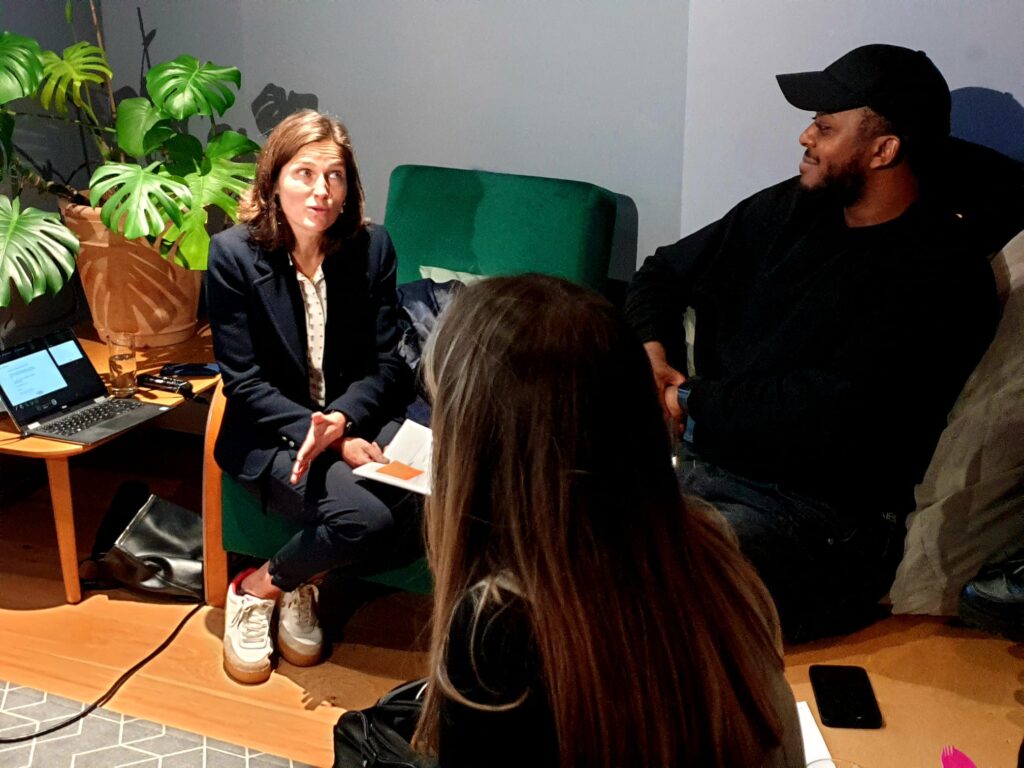
*Extracts from OnBoard Programme Evaluation carried out by Clearview Research conducted in July 2022
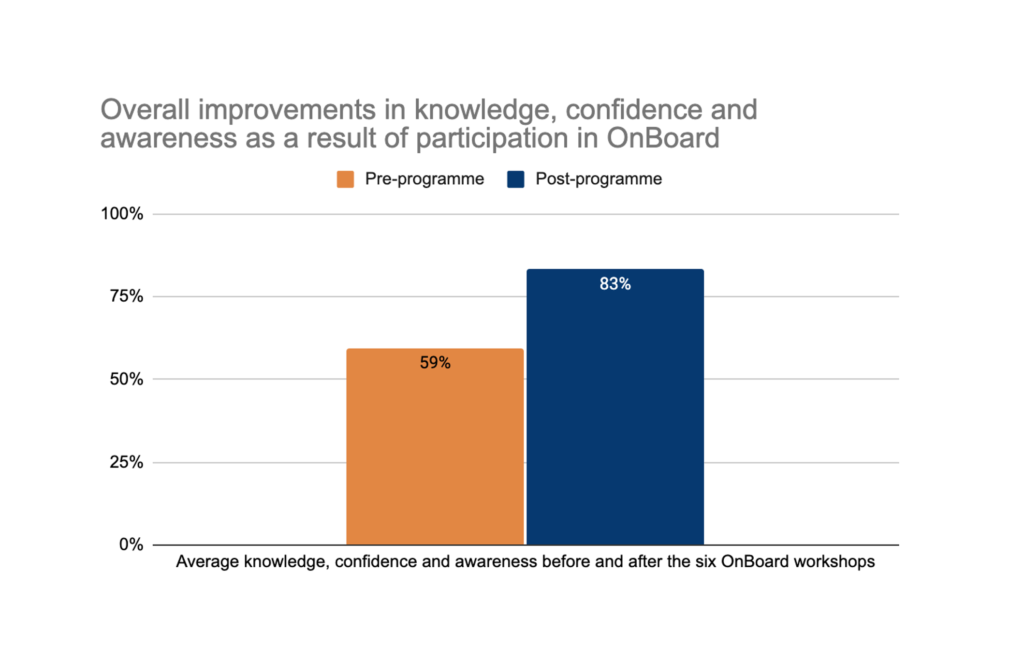
How are organisations actively making inclusion a priority in the recruitment process on the Board?
KI: Well, the reason we developed OnBoard was because we’re not really seeing the diversity and inclusion that is needed. There is a lot of talk and focus on it and suggestion that there is not enough of a pipeline of talent.
LM: A large part of the problem is that the boards and some recruiters are not able to find the talent and the young diverse professionals are not aware that the opportunities exist. We are working hard to match this together but there really does need to be much more investment in this area to improve awareness and really help in the upskilling.
KI: There is also a lot of stereotyping too and we need to encourage those on the programme to understand and address that. They need to be aware of the value, experience and insight that they bring. People are intersectional – they don’t just represent a youth voice or digital experience. There needs to be a far greater understanding from the candidates, the recruiters and the boards about the wider value of different backgrounds and experiences and think about what inclusion means in its truest sense.
There is plenty of talent out there but not enough is being invested across all sectors to find it. We’ve never struggled to find diverse talent: candidates are there, we just need to get them the chance.
How can organisations ensure that an inclusive culture is embedded before it starts to recruit, which allows diversity (in all its forms) to thrive?
KI: When we talk about diversity and inclusion, it always has to start from the top where the tone is set. There should be way more accountability around diverse and inclusive boards, as this needs to reflect the entire organisation. People look to the board to understand what it looks like and if totally different to the wider organisation that is not going to successfully filter through. Boards need to accept and acknowledge where they are and how they can be doing more.
There does need to be much more investment in this to proactively expand networks, train more people and really identify a pipeline of valuable candidates. If organisations are not willing to invest properly they are going to get a certain type of person.
Inclusion runs deeper than just having certain underrepresented groups on board and that needs to be considered. Timings of board meetings can be challenging for those with childcare responsibilities, for example, or if people have to use up annual leave or need help with travel expenses. Sometimes they will require papers earlier and in a certain format if they have a neurodiversity challenge. Inclusivity is a mindset that requires greater receptiveness.
LM: There is a lot that boards can be doing and inclusion is most definitely not a tick-box exercise. It is a never-ending journey and needs to be thought of like that: it requires investment, consideration and action.
Do we want diversity to become ‘normal’ for boards, or does that defeat its purpose?
KI: We do want greater diversity of course, but it is not just about the opportunity or the confidence. We want to train and equip them to be effective on the board -that is absolutely essential. I genuinely believe that taking part in OnBoard will offer young people and the boards they come to sit on, more benefit than jumping straight into a role. We are teaching people to be effective Board members from the very beginning and that is the only way to truly bring success all round. If they aren’t being effective, then the element of diversity becomes less important. There needs to be a point to it.
LM: I think of boards like rivers where they go on and on and flow and ebb. Different people come in and out, but the board retains its general essence. There will be different types of diversity and different groups of people through the board’s lifetime. Those coming in learn from the people who are in the river upstream and pass on to those downstream, and then they move on and so the flow continues. It is ever changing and that is the way it should be.
Are there certain sectors that are more receptive to building a more inclusive and diverse Board?
LM: Well, we are making very good inroads with charity and not-for-profit boards. For example in healthcare and housing associations, but we are also very keen to identify more opportunities within the commercial sector. We have lots more opportunities coming to us all the time and a lot of aspiration from OnBoard participants and alumni.
Why is it important and beneficial for programmes like OnBoard to have an impact?
KI: First and foremost, it’s what we set out to do. We wanted to cause a dent in this space and make the impact. We understand that we need to collaborate, and we genuinely believe by having more of us on this, teaching and learning that we will make an impact by building a pipeline of effective board members working across all sectors.
For many of those taking part in OnBoard they never felt they could do this because no one told them they could, or they didn’t have the knowledge of the opportunity or the confidence to go for it.
It will not be an overnight impact. It is very much about that ripple effect and we are delighted to have organisations like Saxton Bampfylde supporting us. They do provide time, but also some funding which is vital to help us keep OnBoard going.
I really do believe that people deserve to have opportunities like this and it shouldn’t be for the select few who just happen to be in certain circles.
First and foremost, what we’re really doing here, is proving the impact that effective diverse talent can bring to boards. We aren’t bringing just anyone to a board role; we want the most effective people to ensure that the best governance can be achieved.
LM: I do lots of work involving group decision making and I’ve studied this area too and we know that if there is a diversity of view expressed and people are allowed to dissent and express different views then that brings much better outcomes. With a homogeneous group, you’re not going to get that and it does not enable the best decision making.
What are the future aspirations for OnBoard Programme?
LM: We would like to continue the programme, extend the boards we work with, and increase the range of sectors too. We would also like to do more work with boards on how to integrate the OnBoarders even better at the start of their journey and maintain those relationships and build networks from the first role and beyond.
KI: We need to think about this more broadly – there are lots of people joining who have decades of professional experience but no Board experience. With OnBoard our alumni have learned what a board role involves, how to make impact and how they can, and have to, be effective. I do believe that we should be expanding educational programmes like ours more broadly as a board role really is different to an executive or professional role, and to make them as effective as possible there needs to be greater education and training.
